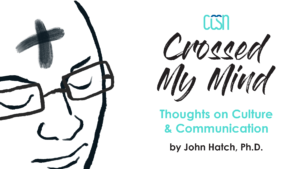 Column title: Crossed My Mind: Thoughts on Culture and Communication
Column title: Crossed My Mind: Thoughts on Culture and Communication
Column entry: “Untangling CRT for Christians (Part 3 of 4)”
By John Hatch, Ph.D.
Eastern University (retired)
CCSN Senior Fellow
Column Description: As Christians, we are called to have the mind of Christ. This goes against the grain of our social and cultural conditioning. We seek personal or political advancement; Christ seeks the lost and the least. We grasp for cultural ascendency; Christ descends to the cross of love. This column is dedicated to thinking about culture and communication under the sign of the cross.
April 2025 / March 2025 / February 2025 / September 2024 / August 2024 / June-July 2024 / May 2024 / April 2024 / March 2024 | February 2024(2) / February 2024(1) / January 2024 / December 2023 / November 2023 / October 2023 / July 2023 / June 2023 / May 2023 / April 2023 / March 2023 / February 2023 / January 2023 / December 2022 / November(2) 2022 / November 2022 / October 2022 / August-September 2022 / June-July 2022 / January 2022 / December 2021 / October-November 2021
Untangling CRT for Christians (Part 3 of 4)
Parts 1 and 2 of this series introduced Ed Uszynski’s Untangling Critical Race Theory (InterVarsity Press, 2024) as a primer, balanced appraisal, and wise guide for Christians responding to CRT. In Part 1, I unpacked Uszynski’s personal and professional qualifications to write on this subject (especially for conservative evangelicals) and summarized his overviews of Marxism and Critical Theory, from which CRT sprang. Part 2 discussed his overview and assessment of Critical Race Theory, as well as how some Christians fail to put it in appropriate perspective. Parts 3 and 4 will look at the second half of Untangling Critical Race Theory, which focuses on helping Christians respond more wisely to race, CRT, and social justice in the church.
Before responding in depth to Christians’ concerns about CRT, Uszynski wisely steps back (in chapter 9) to shine a spotlight on stumbling blocks that prevent us from thinking Christianly about race. Uszynski identifies five such blinders among Christians. The first is conflating secular conflict with church culture conflict, thus obscuring the church’s mission of reconciliation. Another stumbling block is cross-cultural shallowness. The author confesses, “I don’t meet many white Christians who’ve thought meaningfully about race in either their broader cultural or specific church context. So it’s not a stretch to suggest most white Christians live with an underdeveloped racial consciousness.”[1] A third stumbling block is theological myopia: our denominational backgrounds and theological filters can lead us to ignore or overlook matters that concern God, including racial division. Theological filtering works hand-in-hand with biblical selectivity—ignoring passages that don’t fit our cultural, congregational, or personal experiences and biases. The final stumbling block is ethnic indifference—not caring about injustices effecting BIPOC (Black, Indigenous, and People of Color) because they don’t touch us personally or we’re conditioned to seeing them as overblown or irrelevant to the gospel.
Chapter 10 addresses the question of whether CRT has any value for Christians. In effect, this chapter responds to Voddie Baucham’s popular but seriously flawed book Fault Lines, without naming him. For instance, Baucham frames Christians’ use of CRT and books on racism as an attack on the sufficiency of Scripture. Uszynski explains the obvious flaw in such thinking: although Scripture addresses race and ethnicity, “it doesn’t directly address the nuances of American racism or its effect on the church,” which have implications for applying Scripture to our context.[2] Uszynski then flips the script, pointing out that CRT arose precisely because leaders claiming to value Scripture have long ignored passages that didn’t fit their cultural grid: “We shouldn’t need CRT, but for too long the white American church hasn’t paid careful attention to what the Bible says about racial or ethnic division, our responsibility regarding various social injustices, or how we protect marginalized and vulnerable populations. What do we do when the Bible could be enough but hasn’t been for many cultural and political reasons?”[3] Baucham caricaturizes Christian leaders who encourage the church to read books on racial injustice, but Uszynski calls out such false witness: “Fueling antagonism within the church by misrepresenting people offends God and does more long-term damage than whatever racial heresy people are accused of promoting.”[4] Uszynski ends the chapter by asking a question based on language from the SBC’s revised Resolution 9 (which Baucham discussed at length): “What does it look like to use CRT as a tool or a lens in the church?”[5] He suggests five ways in which CRT principles can be usefully contextualized and applied in the church to better recognize our sins and shortcomings with regard to people of color.
With wisdom and care, chapters 11 and 12 address specific problems many Christians have with Critical Race Theory. For example, in response to the objection that CRT over-focuses on race, Uszynski writes, “Of course it does—that’s the whole point . . . CRT exists as a reaction to those who conveniently now never consider the racial implications of living in a country that for centuries made everything a racial implication.”[6] Uszynski acknowledges that CRT sometimes overcorrects for this racial blindness, but concludes that “it’s still better to take race too seriously and back off than to never consider it at all.”[7] Regarding the idea that CRT creates a divisive racial consciousness, Uszynski offers a reality check: white members of evangelical ministries may nostalgically recall a warm Christian unity prior to the recent advent of racial consciousness-raising efforts, but in fact most people of color in those organizations didn’t experience that unity. As for the accusation that CRT judges everyone by the groups they belong to, Uszynski wisely brings his experience with sports ministry into the picture: coaches often take their entire team to task for its shortcomings, even though some members of a team are more at fault than others, because “we all understand that, as a team, we must wear it together.”[8]
Chapter 12 brings similar insight to other concerns about CRT. Uszynski begins by highlighting the difference between hearing about racial incidents from a safe distance and compassionately connecting with those affected, as Jesus did. Objections to CRT, he notes, “often ignore context and the particulars people face.”[9] For instance, complaints against the concept of white privilege tend to focus only on obvious factors such as employment and income (in which some black people are better off than some white people), while overlooking the cultural norms of whiteness that black people must navigate every day in the United States. Uszynski also confronts false binaries, such as pitting personal responsibility against systemic justice or the Bible against Critical Race Theory, when in fact these things are not in direct opposition and can work hand in hand.
One thing I appreciate about Uszynski’s approach is that he keeps bringing us back to the big picture in Christ, which transcends our false binaries, blinders, and cultural filters. Indeed, the final three chapters of Untangling Critical Race Theory move beyond questions about CRT to the larger quest for biblical justice and healing in the church. I’ll discuss his thoughts related to this topic in part 4.
* The views of any CCSN columnists are their own, and do not necessarily represent the views of the CCSN. We invite and embrace a wide range of views and critiques on important communication and cultural issues from a Christian perspective. The CCSN is a community of Jesus followers who study communication. We do not support or promote a particular social, political, or denominational agenda.
Notes
[1] Ed Uszynski, Untangling Critical Race Theory: What Christians Need to Know and Why It Matters (Downers Grove, IL: 2024), 146.
[2] Uszynski, Untangling Critical Race Theory, 158.
[3] Uszynski, Untangling Critical Race Theory, 158, emphasis added.
[4] Uszynski, Untangling Critical Race Theory, 162.
[5] Uszynski, Untangling Critical Race Theory, 164, emphasis added.
[6] Uszynski, Untangling Critical Race Theory, 170.
[7] Uszynski, Untangling Critical Race Theory, 171.
[8] Uszynski, Untangling Critical Race Theory, 183.
[9] Uszynski, Untangling Critical Race Theory, 187.

